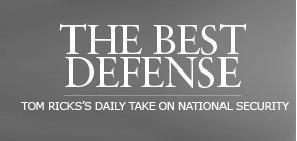Gourley: What I want is not just blogs that have data, but blogs that have meaning

By Jim Gourley
Best Defense
commenter of the year
Last week Tom
requested suggestions for new blogs to add to his daily reading list. I thought there were some interesting
recommendations from readers, but after investigating each one I went back and
clicked through the different windows in succession to gain a little more
perspective.
Looking at them in
aggregate provoked questions. The whole is greater than the sum of its parts,
so what world view would the range of sites produce? How does the news feed
presented by these sites differ from what Tom is probably already reading?
Grouping the sites by their emphasis implies that view would be primarily technology-based,
lightly seasoned by some current events in specific regions with dubious
commentary. There is very little context. By and large, it lacks breadth and
depth. The spectrum of information is narrow and the range of subjects too
one-dimensional to provide necessary background.
I read lots of
blogs, none of them regularly and not all of them related to defense matters
per se, but I tend to see value in unique cultural overlaps. I seek context, perspective, answers. Lately, I find the blogosphere
giving me more questions than answers.
Spend enough time
reading the tech blogs and you'll see that there are scores of unmanned weapons
systems in development in the United States and throughout the world. Within
fifteen years we may have a UAV that brings J.J. Abrams' new television series to life, warships with lasers, and bipedal battlefield terminators assistants. All of these blog posts follow the same thematic
approach. They simply show us the technology. That's valuable information, but
I only need to see it once.
Nowhere can I find
answers to the immediate questions I ask upon reading these blogs. Why are we
developing these technologies? What existing weapons programs that we're
currently shoveling money into will be rendered obsolete by these new weapons?
Where does the care and equipping of human service members fit into this?
Exactly what threats and enemies are such weapons meant to counter, and what
retaliatory developments do we anticipate said enemies to attempt? Do we have a plan or are we just building stuff?
Intelligence and
strategy blogs have made the pivot to China well in advance of the defense
department, it seems. The American political discourse about the Chinese threat
was electrified during the presidential campaign and think tanks are moving
apace with speculations of what a conflict with China would look like. But in all the debate over who would do best at
"getting tough with China," I didn't hear a compelling argument for
getting tough in the first place. Is China really our enemy? Do they have to be
our enemy? Is the conventional wisdom more conventional (or perhaps convenient)
than it is wise? I have no end of questions about what the American security
establishment thinks of China because there is no clear explanation of how it
thinks about China. Is there a blog for that?
The defense,
intelligence and national law enforcement architectures continue to meld in
ways both mysterious and disturbing. The DEA has operated in Afghanistan for a
number of years. Predator drones have been used to track cattle rustlers in North Dakota. Part of President Obama's legacy
will be a government that can wire-tap my phone without a warrant and assassinate me without due process. I see these developments and I have more
questions. Are there still such things as American defense, intelligence and
law enforcement establishments, or is it gelling into a monolithic
"security establishment?" How long a shadow does it cast and do civil
liberties and posse comitatus fall underneath it? Is everyone contributing to
this emergent construct actually okay with the potential consequences, or are
we just following orders?
Blogs are a
relatively new species in the journalism environment, but already the
conceptualization of them has become traditional. They were conceived as
web-based forums for microbursts of data to help news organizations keep up
with the increasing pace of information flow. It was believed that the in-depth
analysis would be left to the more substantive print media side of the house.
The value of print has already been challenged and found lacking, but so too
should the idea that synthesis and analysis can maintain the old pace as
developments continue to accelerate. Blogs can't just be places to collate data
points any longer. They need to start connecting the dots that are rapidly accumulating.
I think 'Best Defense' has succeeded in that endeavor, but Tom depends on good
sources of information like any human being. There are more questions than
ever. More blogs ought to attempt answering them. Those answers matter now more
than ever, because the new pace to which blogs have contributed is not going to
wait.
Jim Gourley has been elected to
the Best Defense all-star commenter team three years running.
Thomas E. Ricks's Blog
- Thomas E. Ricks's profile
- 436 followers



